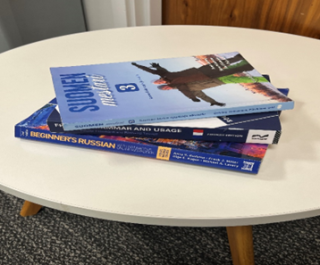Study Tips for Linguists: Maintaining and Learning Languages
12 February 2024
Kevin Matyszewski, BA Finnish and French student at SSEES shares his top study tips for linguists.

It is a common misconception that learning many languages at once is nearly impossible and should be avoided. There is no doubt that the task is challenging, especially given the quantity of responsibilities we all have as students. However, with the right amount of determination and effective methods, no matter how different or similar the target languages are, nor how skilled you are as a learner, it is very much a possible and, most importantly, an extremely enjoyable process.
Learning a language requires daily practice and immersion. This can be difficult when you are not living in a country where your target language(s) is/are spoken. Luckily, this immersive environment can be replicated through simple and easy activities that can be incorporated into your schedule, no matter how busy it is. Firstly, think about which language you are struggling with the most. Once chosen, create a study set using apps like Quizlet and continue adding new vocabulary to it after every language class. This set can be used in the morning, for example after waking up; you can just do some matching activities for a few minutes, at the same time making sure you are saying the words aloud. Try your best to repeat this process just before your language classes. Eventually, you will notice that you are subconsciously memorising all the words and recognising them in writing! It will almost seem like magic!
If there is a language that you are confident with and feel like the only missing element is getting used to hearing it, you will be pleased to know that there are fun and engaging methods to improve your skills. Every evening, or whenever you have the time, treat yourself to a TV series! It does not have to be from the country where your language is spoken if you can change the audio settings to the language you aim to master. Try not to look at the subtitles and instead concentrate on what the actors are saying and pick out the different words and grammar points they are using. By doing this regularly, you will notice that you will get used to understanding fast conversations and build your vocabulary for many different conversation themes. You will also be able to rapidly recognise minor grammatical elements like contractions!

For those who enjoy reading, make sure to read books that are appropriate for your language level, meaning ones that do not use difficult idiomatic expressions and difficult vocabulary. You may think that learning a language through reading requires you to search for the definition of every single unknown word you encounter. This is untrue and should be avoided because it will discourage you from continuing the book. Instead, only search up those words that recur as you will be able to understand the meaning of other phrases using the context and your existing knowledge of other words.
Finally, writing and grammar practice should form the foundation of your language-learning process. Try your best to not neglect the grammar work given by your teachers; it is important to do grammar exercises regularly and read those constructions aloud. If there are certain words that are extremely challenging to memorise, the best way to solve this problem is to use them in a sentence. This way, you will have a visual representation of them and subsequently become accustomed to seeing and using them on a regular basis without hesitation.
The above-mentioned methods are, of course, not the only ones available. It is important to try out various techniques to see which ones fit around your schedule, which ones are effective and most importantly, which ones seem enjoyable! Make sure you do not overwork yourself otherwise you will struggle with retaining information and discourage yourself from pursuing your language goals. Best of luck!
Learn more about Languages and Culture at UCL SSEES.
 Close
Close

